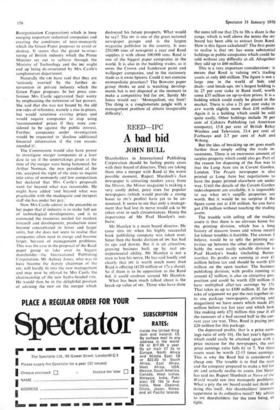REED-IPC
A bad bid
JOHN BULL
Shareholders in International Publishing Corporation should be feeling pretty cross with their board of directors. They are taking them into a merger with Reed at the worst possible moment. Rupert Murdoch's Sun newspaper is attracting readers away from the Mirror, the Mirror magazine is making a very costly debut, price rises for popular newspapers (which would provide a strong boost to IPC'S profits) have yet to be an- nounced. It seems to me that only a manage- ment that had lost its nerve would ask to be taken over in such circumstances. Hence the importance of Mr Paul Hamlyn's -out- burst.
Mr Hamlyn is a main board director. He came into in when his highly successful book publishing company was taken over. Since then the books division of IPC has had its ups and downs. But it is an attractive, growing business built up by real en- trepreneurial ability. Mr Hamlyn is not a man to lose his nerve. He has said loudly and clearly that IPC is worth much more than Reed is offering (£120 million or 17s a share). So if there is to be opposition to the Reed bid, it could coalesce around Mr Hamlyn.
What has been much talked about is the break-up value of IPC. Those who have done the sums tell me that 25s to 30s a share is the range, which is well above the terms the IPC board has been able to extract from Reed. How is this figure calculated? The first point to realise is that IPC has some substantial holdings in public companies which could be sold without any difficulty at all. Altogether they add up to £60 million.
This is a very important consideration: it means that Reed is valuing tee's trading assets at only £60 million. The figure is not a large one in the world of bids and deals—and break-ups. IPC'S largest holding is its 27 per cent stake in Reed itself, worth some £35 million on up-to-date prices. It is a holding which could easily be placed in the market. There is also a 21 per cent stake in ATV worth slightly more than £10 million. Again it is a holding which could be sold quite easily. Other holdings include 30 per cent of Cahners Publishing (an American company), 15.8 per cent of British Relay Wireless and Television, 33.4 per cent of Forbuoys and 2.7 per cent of Ault and Wiborg.
But the idea of breaking up IPC goes much further than simply selling the trade in- vestments. There is an enormous amount of surplus property which could also go. Part of the reason for disposing of the Sun was to free the Long Acre site in Covent Garden, London. The People newspaper is also printed at Long Acre but negotiations to have the paper printed elsewhere are under way. Until the details of the Covent Garden redevelopment are available, it is impossible to say what sec's surplts properties are worth. But it would be no surprise if the figure came out at £10 million. So you have got £70 million without touching the trading assets.
The trouble with selling off the trading assets is that there is no obvious home for the printing division, which has a long history of massive losses and whose record for labour troubles is horrible. The answer, I believe, would be to split the printing ac- tivities up between the other divisions. Pro- bably the most easily saleable division is Paul Hamlyn's books (including Butter- worths). Its profits are running at over fl million before tax and should be worth £10 million on the open market. The business publishing division, with profits running at around £2 million, is also an attractive pro- position and could be worth £20 million (I have multiplied after-tax earnings by 15).
That takes us up to £100 million. If, for the sake of argument we put the rest together in- to one package (newspapers, printing and magazines) we have assets which made £91 million before tax last year and which look like making only £7 million this year if all the rumours of a bad second half to the cur- rent year are true. Thus, Reed is paying just £20 million for this package.
On depressed profits, that is a price earn- ings ratio of only 101. On last year's figures, which could easily be attained again with a
price increase for the newspapers, the exit price earnings ratio falls 151 to 7. Yet these assets must be worth 12-15 times earnings.
This is why the Reed bid is considered a cheap one. The trouble is to find the man and the company prepared to make a bid for
IPC and actually realise its assets. Jim Slater has said no. Rupert Murdoch at News of the World would run into monopoly problems.
What a pity the IPC board could not think of doing this itself. Are shareholders' interests uppermost in its collective mind? My advice to IPC shareholders: for the time being, sit tight.


































 Previous page
Previous page